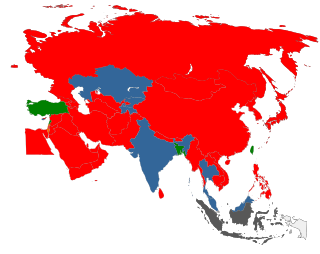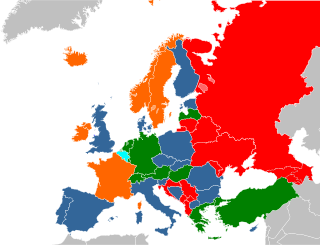Related Research Articles
Child sex tourism (CST) is tourism for the purpose of engaging in the prostitution of children, which is commercially facilitated child sexual abuse. The definition of child in the United Nations Convention on the Rights of the Child is "every human being below the age of 18 years". Child sex tourism results in both mental and physical consequences for the exploited children, which may include sexually transmitted infections, "drug addiction, pregnancy, malnutrition, social ostracism, and death", according to the State Department of the United States. Child sex tourism, part of the multibillion-dollar global sex tourism industry, is a form of child prostitution within the wider issue of commercial sexual exploitation of children. Child sex tourism victimizes approximately 2 million children around the world. The children who perform as prostitutes in the child sex tourism trade often have been lured or abducted into sexual slavery.

The legality of prostitution in Asia varies by country. There is often a significant difference in Asia between prostitution laws and the practice of prostitution. In 2011, the Asian Commission on AIDS estimated there were 10 million sex workers in Asia and 75 million male customers.

Human trafficking and the prostitution of children has been a significant issue in the Philippines, often controlled by organized crime syndicates. Human trafficking is a crime against humanity.
Prostitution in Denmark was partly decriminalised in 1999, based partly on the premise that it was easier to police a legal trade than an illegal one. Third-party activities, such as profiting from brothel administration and other forms of procuring, remain illegal activities in Denmark, as do pimping and prostitution of minors.
Prostitution in Guatemala is legal but procuring is prohibited. There is an offence of “aggravated procuring” where a minor is involved. Keeping a brothel is not prohibited.
Prostitution in Georgia is illegal but widespread, particularly in the capital, Tbilisi. Many NGO's attribute this to the harsh economic conditions according to the US State Department. Prostitution occurs on the streets, in bars, nightclubs, hotels and brothels. UNAIDS estimate there are 6,525 prostitutes in Georgia.
Prostitution in Nicaragua is legal, but promoting prostitution and procuring are prohibited. The minimum age for prostitutes is 18 years old. It was estimated in 2015 that there were around 15,000 prostitutes in the country.
Prostitution in Panama is legal and regulated. Prostitutes are required to register and carry identification cards. However, the majority of prostitutes are not registered. There are 2,650 sex workers registered with the government in 2008, but there was no accurate information regarding the total number of persons practising prostitution in the country. Some estimate put the number of unregistered prostitutes at 4,000.

Prostitution is legal and regulated in Bangladesh. Prostitutes must register and state an affidavit stating that they are entering prostitution of their own free choice and that they are unable to find any other work. Bangladeshi prostitutes often suffer poor social conditions and are frequently socially degraded.
Prostitution in Trinidad and Tobago is legal but related activities such as brothel keeping, soliciting and pimping are illegal.
Prostitution in Cameroon is illegal but tolerated, especially in urban and tourist areas. In the capital, Yaoundé the main area of prostitution is the neighbourhood of Mini Ferme. UNAIDS estimate there are 112,000 sex workers in the country.

The legality of prostitution in Europe varies by country.
Prostitution in Guyana is illegal but widespread. Prostitution law is antiquated and dates from the colonial era. Law enforcement is inconsistent and sex workers report violence and abuse by the police. Many turn to prostitution for economic reasons and the lack of other job opportunities. Prostitution continues to receive greater public attention due to the high incidence of HIV/AIDS among prostitutes. Prostitution in the country is separated into three types: "uptown", servicing affluent clients, "downtown", servicing the working classes, and mining sites. UNAIDS estimate there to be 6,000 prostitutes in the country.

Prostitution in Malta is itself legal, but certain activities connected with it, such as running a brothel and loitering, are not. Certain offences are punishable by sentences of up to two years in prison. In March 2008, police and the Malta Ministry for Social Policy signed a memorandum of understanding to formalize a screening process for all arrested persons engaged in prostitution to determine whether they were victims of trafficking or other abuses. The law provides punishments of up to 6 years for involving minors in prostitution.
Prostitution in North Macedonia is legal, though with various restrictions, and common. UNAIDS estimate there are 3588 prostitutes in the country. The Macedonian government is trying to clamp down on prostitution.
Prostitution in Croatia is illegal but common. Forcible prostitution, any kind of brothels, or procuring are treated as a felony, while voluntary prostitution is considered to be infraction against public order. Like in many other Southeast European countries, the problem of human trafficking for the purposes of sex is big in Croatia.

In the United States, each state and territory sets the age of consent either by statute or the common law applies, and there are several federal statutes related to protecting minors from sexual predators. Depending on the jurisdiction, the legal age of consent is between 16 and 18. In some places, civil and criminal laws within the same state conflict with each other.
Prostitution in Rwanda is illegal in all aspects. Prostitutes, clients and any involved third parties are criminalised by the country's Penal Code. However, a draft of a new Penal Code that does not prohibit prostitution was presented for debate in the Rwandan Parliament in December 2017.
Prostitution in Northern Ireland is governed by the Human Trafficking and Exploitation Act 2015, which makes it illegal to pay for sex in Northern Ireland. Prior to the act coming into effect, prostitution in Northern Ireland was regulated by the same or similar laws to those in England and Wales, as it is elsewhere in the United Kingdom. At that time, prostitution in Northern Ireland was legal subject to a number of restraints which controlled certain activities associated with prostitution, such as soliciting, procuring, living on the proceeds of prostitution (pimping), exploitation of prostitutes, under-age prostitution, and keeping a brothel. However, devolution provided the opportunity for separate legislation in Northern Ireland.
Prostitution in Mongolia is illegal but widespread in some areas. The Global Fund for Tuberculosis, HIV/AIDS and Malaria estimated there were about 19,000 sex workers in the country in 2006. Many women in Mongolia turn to prostitution through poverty.
References
- ↑ "The Legal Status of Prostitution by Country". ChartsBin. Retrieved 20 January 2018.
- 1 2 3 "Unbridled flesh trade in the border town". Bhutan Times . Archived from the original on 31 March 2012. Retrieved 18 September 2011.
- 1 2 "Sex, sleaze and the city". Bhutan Observer . Archived from the original on 3 April 2012. Retrieved 18 September 2011.
- 1 2 Wangmo, Lucky (5 July 2017). "Govt shoots down proposal to legalize sex industry – Business Bhutan". Business Bhutan. Retrieved 20 January 2018.
- ↑ Pem, Damchoe (29 July 2017). "400 to 500 possible sex workers in Bhutan - The Bhutanese". The Bhutanese. Retrieved 20 January 2018.
- 1 2 "Bhutan 2017 Trafficking in Persons Report". U.S. Department of State. Archived from the original on 3 July 2017.
 This article incorporates text from this source, which is in the public domain .
This article incorporates text from this source, which is in the public domain . - 1 2 Dema, Kinga (12 December 2015). "Sex tourism, an emerging vulnerablity". Kuensel. Retrieved 20 January 2018.
- ↑ "Penal Code of Bhutan" (PDF). Royal Government of Bhutan. 2004. Retrieved 20 January 2018.
- ↑ "Bhutan 2018 Trafficking in Persons Report". U.S. Department of State. Archived from the original on 29 July 2018. Retrieved 29 July 2018.